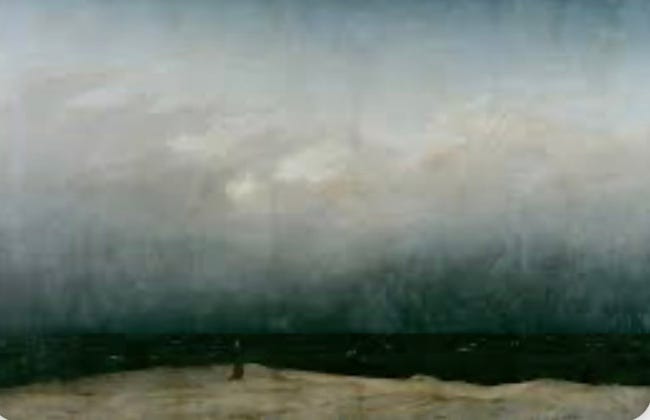They Just Didn’t Listen
Twenty-five years ago, when my younger son Michael was five years old, I started telling him a series of original bedtime stories called “They Just Didn’t Listen.”
The plots were all the same: there was an impending and existential threat to our planet in the form of a rotating cast of aliens, dinosaurs, or natural disasters such as tidal waves or asteroids. A desperate world leader would call Michael for his always spot-on advice––melt the rampaging aliens with water or placate the rampaging dinosaurs with candy.
Initially, the leader would ignore Michael’s advice, perhaps because he was only five, and thus needless tragedy would ensue. Only then would Michael’s advice be followed and the planet saved.
Back in Michael’s bedroom, when the story was over, Michael and I would chant “They Just Didn’t Listen.” My theory at the time was that Michael, as the youngest of three siblings by four and six years, might benefit from hearing stories where he was the hero, ignored only at great peril. What long term effect, if any, my stories had on young Michael is a question for another time.
You, my readers, keen students of the human psyche, will have already guessed that these stories were actually less for Michael’s benefit and far more for mine.
New York City, is my microphone on?
This Tuesday Zohran Mamdani was elected mayor of New York City. He was not the candidate I wanted, and I was angry that NYC hadn’t “listened” to me. On Wednesday and Thursday, I tried to write an essay that explained why I was angry, centered on my Jewish identity. But every draft seemed to serve only my own anger and say nothing new.
Mamdani’s election is already a divisive event. Many of my fellow New Yorkers are celebrating with newfound hope and many are predicting doom for New York City.
Why would I want to throw cold water on the hopes of the celebrants and add to the dismay of the doomsters? No, I don’t want to be that irascible, old crank.
I saw my brother on Thursday. He voted for Mamdani, and we had a gentle and good-humored conversation about it. The thought that I would send him one of my angry drafts became absurd.
Because why would I conduct myself differently in this newsletter than in conversation with my brother? Wouldn’t that be hypocritical?
The hypocrisy of Dorian Gray and his tormentor
This week I read Oscar Wilde’s The Picture of Dorian Gray and then discussed it as a participant in Laura Kennedy’s delightful book group. 1
Dorian is a beautiful, wealthy young man with the impressionable mind of an adolescent, an orphan who has received no moral education. A blank slate.
Enter his evil, older friend Lord Henry who for his own amusement convinces Dorian that the only life worth living is a life of sensations and hedonism unconstrained by a lesser man’s moral considerations. With his words, Lord Henry succeeds at thoroughly perverting Dorian who decides to live by Lord Henry’s code of moral dissolution.
But Lord Henry does not obey his own code. Lord Henry lives a highly respectable life. As I recall Laura Kennedy saying, the hypocrisy in the novel is stunning. Many cult leaders turn out to be arch hypocrites whether they have a million followers or, like Lord Henry, a single follower in Dorian.
The subsequent story is well known. Dorian’s descent into debauchery and murder, the mark of his sins appearing only in a magical, hidden painting that grows more gruesome with Dorian’s every immoral act while Dorian’s outward beauty changes not at all.
Both Lord Henry and Dorian live double lives, the one between saying and doing, the other between his perfect, Instagram-ready face and the face he hides away.
In the end, guilt consumes Dorian, and he dies a miserable death. Lord Henry is unscathed and we can imagine him going on to his next victim.
One of Oscar Wilde’s most famous aphorisms asserts:
“There is no such thing as a moral or immoral book. Books are well written, or badly written. That is all.”
That may be true about novels. But one lesson from Dorian Gray is that it is immoral to keep different sets of moral books, like a crooked accountant.
Moral constancy is good
There’s a term called “egoic bifurcation,” which means that in the age of social media we adopt two identities––who we are on social media and who we are in real life. (a. natasha joukovsky introduced me to this concept.) 2
I don’t like the idea that I would say one thing face to face to someone and another thing in my writing. I prefer the relaxed tone I used in conversation with my brother about Mamdani to the sharp tone of my written drafts.
I see no reason why my moral standards should differ in different modes. If anything, the moral standards in my writing should be higher because I’m reaching many more people in a format that has limited scope for active discussion. And words are hard and stubborn things while the best conversations are supple and amenable, with their thrusts, parries, concessions, and compromises.
My moral ambition
My moral ambition is that I should not slip the bonds of humility and justice in my actions, conversations, or writings. I find that when I am angry and frustrated, I too often lose my sense of humility. I become too certain, too righteous, sometimes willfully blind to the other side of a position or issue. My writing becomes unsubtle and common, thus less interesting because I don’t spark questions that can be intelligently debated.
It is dull to read a contentious screed, the substance of which could be found in countless other places. Much better to focus on what is subtle, channeled through what is personal and unique to me.






Your "stories" remind me of an incident with our oldest son Benjamin when he was a little younger than your son.
Jeannete had been "homeschooling" him about crossing busy roads
So, upon seeing a road killed skunk, he turned to her and remarked, "He should a listened to his mudda"
David, it's been a long time since any of us has been able to vote for a politician With unbridled enthusiasm. Mamdani obviously crossed some sort of red line for you. Are you clear on what that red line specifically was? From my perspective, the mayor of New York has such limited power that they are likely unable to influence events much for good or evil. I hypothesize that you are suffering from MDS— Mamdani Derangement Syndrome, expecting that he will accomplish some great evil, when he has much less capacity to do so than our non-beloved President.